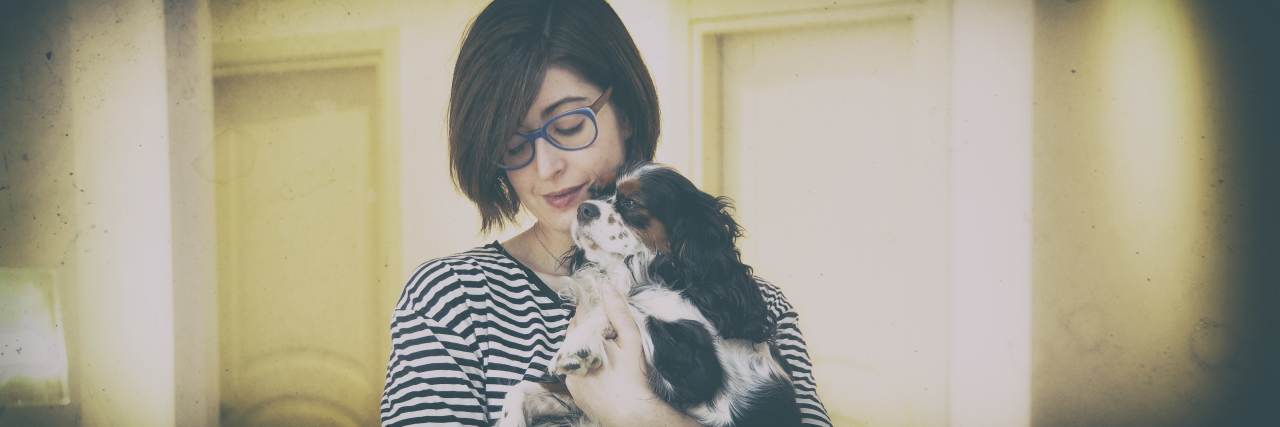Sometimes I worry I am not “disabled enough” for the accommodations I receive. Specifically, I overthink my need for my service dog, Winnie. I realize I have substantial limitations for numerous life activities, mostly cognitive-based activities such as concentrating, thinking and learning. Yet, despite the conversations I have had with professionals about my disabilities and the impact of my conditions on my life, I feel like a fake. A poser. An imposter.
I believe these thoughts and feelings, while perpetuated by my conditions, are rooted deeply in the ableist view of disabilities in today’s world. Society tends to only recognize physical disabilities, such as blindness, deafness and motor difficulties. This bias is shown in most of the signage and terminology of disability. For example, blue disability parking permits show a person in a wheelchair. This creates the idea that disability is synonymous with physical conditions and leaves invisible and mental impairments out of the discussion. Some mental or medical conditions qualify people for the use of a disability parking permit, but those situations are rarely discussed or accepted due to ongoing bias.
Some days, I believe my disabilities are not as real, not as valid because they are psychiatric in nature. I am so quick to validate others’ physical medical conditions and disabilities, but have difficulty accepting my own psychiatric disabilities. For some reason, they seem less detrimental and important than physical conditions, despite numerous sources stating that psychiatric conditions can be just as challenging and difficult to manage as conditions which are solely of a physical nature.
I was diagnosed with postural orthostatic tachycardia syndrome (POTS) this past November. When I received this diagnosis, part of me felt comforted in knowing I had a physical condition, and validated my identity as a spoonie (a nickname for people with chronic illnesses). While I believe my POTS plays a role in my psychiatric symptoms, my primary disabilities are still, for the time being, psychiatric in nature. Soon after I had these thoughts, I felt disappointed in myself for buying into society’s ableist views of what is an “acceptable” disability and what is not.
Albus Dumbledore from the Harry Potter book series, once said, “Of course it is happening inside your head, Harry, but why on earth should that mean that it is not real?” I try to remember this quote when I begin doubting my disabilities because they are invisible and mental. Just because my struggles are not outwardly apparent (I go to great lengths to hide them and have learned how to do so well) does not mean they are less valid or important than a physical condition.
I am slowly coming to acceptance of my limitations and being able to call myself a disabled individual without it defining who I am as a person. Recently, I bought a new laptop case and stickers to put on it. Several of these stickers are about disability, accessibility, service dogs and POTS. I am becoming more comfortable with who I am and instead of being ashamed, I am owning it and allowing for it to be one component that makes me the unique individual I am.
I refuse to let my psychiatric and medical conditions define me as a person. I am still a young college student who enjoys reading, writing, exploring and binging Netflix shows. I love hanging out with friends at coffee shops and going on outings when able. I participate in organizations on my college campus, hold leaderships positions and am even employed. While I have limitations, I am not completely consumed by them. Are they difficult to deal with? Yes, very much so. With the right accommodations and support, can I thrive as a person and achieve my goals? Yes!
Finally, remember that not all disabilities are visible. In fact, many are not outwardly apparent. Do not judge a person who seems “fine” when they use a blue badge to park in a disability parking spot or who uses an accessible bathroom stall even when they’re not using a mobility device. Some mental and invisible disabilities require the use of accommodations. With Winnie, I am learning to be more confident in my disability and my use of a service dog. I deserve this accommodation, as it allows me to attend college and lead a more independent life.
Please try to see beyond society’s able-minded view of disability to include those you cannot see simply by looking at a person. Only by widening our understanding of disability will we be able to work towards a truly accessible society for everyone. One of my new laptop stickers states, “The future is accessible.” I believe this is true, but it requires a shift in societal thinking about disabled people and their role and deserved place in society.
Getty image by DP3010.

